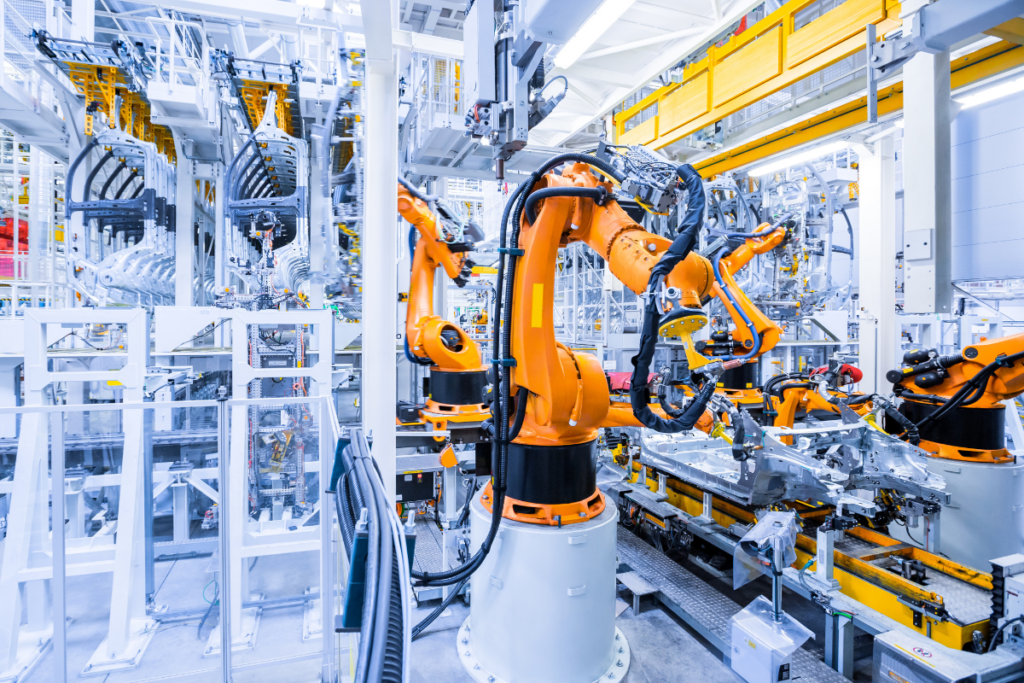Precision machining has long been synonymous with skilled technicians utilizing lathes, milling machines, and other tools to shape raw materials into intricate components. While craftsmanship was paramount, the process was time-consuming and offered limited scale.
The introduction of computer numerical control (CNC) machines marked a significant leap forward, automating certain processes of machining and fabrication. However, the full potential of automation and other aspects of metalworking was unlocked with the evolution of robotics.
Robotics are a technological revolution that has reshaped the manufacturing landscape. Its advancement has helped fabrication experts manufacture products with unprecedented precision, efficiency, and flexibility, ushering in a new era in precision machining.
In this month’s blog, we explore the game-changing impact that robotic systems have had on the intricate world of precision machining, along with the benefits this new technology delivers to our ever-changing industry, including:
Enhanced Precision And Accuracy
Robotic systems deliver unparalleled accuracy to the manufacturing process. They have the ability to execute complex tasks with micron-level accuracy, ensuring high-quality to-spec results and reducing the need for rework, ultimately saving time and resources while optimizing scheduling.
Unmatched Flexibility And Adaptability In Precision Machining
One of the key features of robotic systems in precision machining is their inherent flexibility and adaptability. Unlike traditional machinery that is often designed for specific tasks, robotic systems can be reprogrammed and reconfigured swiftly to accommodate diverse manufacturing needs, including material handling, loading and unloading, and intricate machining operations.
This flexibility is particularly valuable in the rapidly changing landscape of modern manufacturing, where adaptability to market demands is crucial for achieving sustainable success.
Increased Precision Machining Efficiency Through Automation
Robotics in precision machining heralds a new era of automation. Automated systems are capable of performing repetitive tasks tirelessly 24/7 without the need for breaks or shifts, accelerating the production cycle and minimizing downtime. Additionally, robotics can outperform human operators in terms of speed and consistency in high-volume production scenarios, allowing manufacturers to meet growing demands with greater ease and competitiveness.
Complex Geometries And Intricate Designs
The integration of robotics enables the machining of complex geometries and intricate designs that would be challenging for traditional methods. Advanced robotic arms equipped with multi-axis capabilities can maneuver with unparalleled agility. In precision machining, this translates to components with tighter tolerances and the creation of intricate shapes and finely detailed patterns with a lower risk of error. This opens up new possibilities in product design and engineering, allowing manufacturers to push design boundaries that were once considered unattainable.
Improved Safety And Ergonomics
The integration of robotics in precision machining also contributes to improved workplace safety. Dangerous and strenuous tasks can be delegated to robotic systems, reducing the risk of accidents and minimizing the physical strain on human operators. This shift towards a safer working environment is essential in attracting and retaining skilled labor and complying with workplace safety policies.
Collaborative Robots (cobots)
Unlike traditional industrial robots, collaborative robots are designed to work alongside humans. In precision machining, cobots enhance efficiency by assisting operators in repetitive or physically demanding tasks. Their ability to adapt to changing tasks and work safely in close proximity to humans makes them valuable assets in modern precision machining environments.
Integration With Artificial Intelligence (AI)
Integrating AI algorithms empowers robotic systems to learn and adapt through machine learning, enabling robots to optimize tool paths, predict tool wear, and continuously improve efficiency. The result is a dynamic and adaptive machining process that can respond to changing parameters in real time.
Strategic, Data-Driven Decision-Making In The Precision Machining Process
Sensors and monitoring systems integrated into robotic setups collect real-time data on parameters such as tool wear, temperature, and vibration. Analyzing this data allows manufacturers to implement predictive maintenance strategies, reducing unplanned downtime and optimizing the overall equipment effectiveness of the machining process.
Integration With Industry 4.0
The marriage of robotics and precision machining is a pivotal aspect of the Industry 4.0 revolution. Smart technologies, sensors, and connectivity can all be integrated with robotic systems, creating an intelligent manufacturing environment that fosters a holistic and optimized approach to precision machining.
Read More: Trends And Innovations In Precision Machining
Contribution To Sustainability Objectives
Robotic precision machining can contribute to a company’s sustainability goals by optimizing material usage, reducing waste, and improving energy efficiency. As manufacturers prioritize eco-friendly practices, robotic systems will continue to play a pivotal role in achieving these targets.
Read More: Global Footprint
Kenona Industries: Adopting The Most Advanced Machining Technology Available
Kenona Industries/Arrow Automotive uses the latest precision machining technology, including robotics, to design, fabricate, and deliver precision-engineered parts to leading automotive OEM and Tier 1, 2, and 3 suppliers. We have 14 in-house technical experts who specialize in robotics/automation/controls. All of our work is done on-site without any outside integration, saving our customers time and money while improving project lead times.
With over 35 years of expertise in providing high-volume machined components that contribute to gas-powered and electric vehicles’ overall efficiency, reliability, and safety, Kenona is your only stop for quality metal fabrication solutions.
Discover everything that sets us apart by requesting a quote for your next project today!
